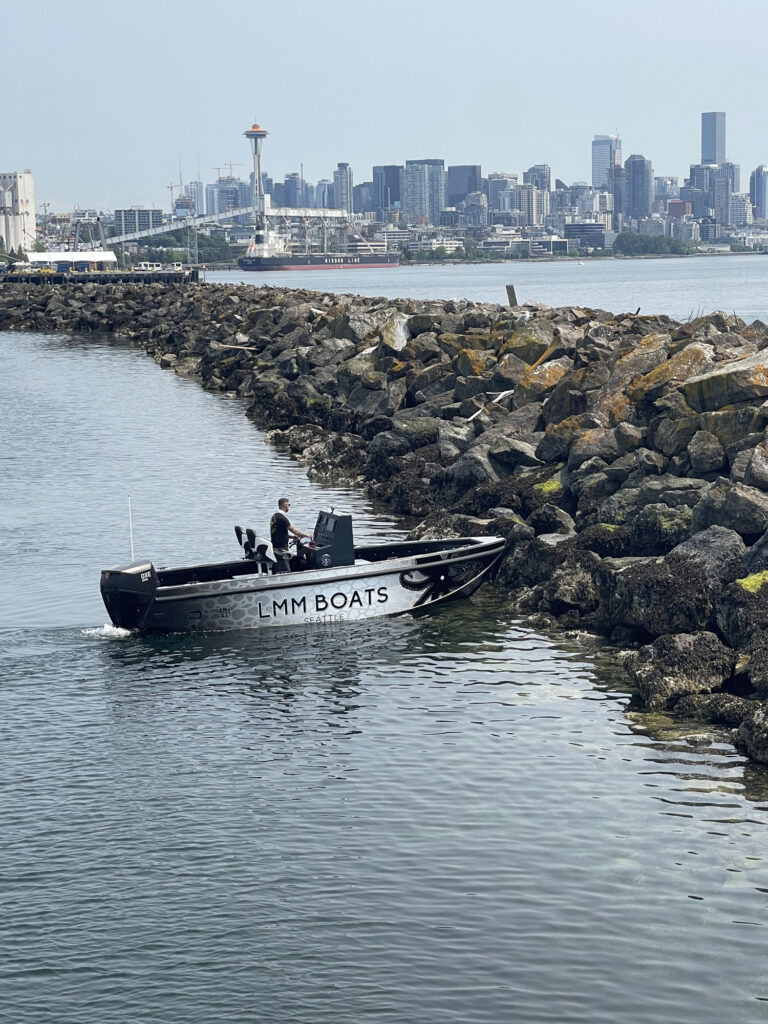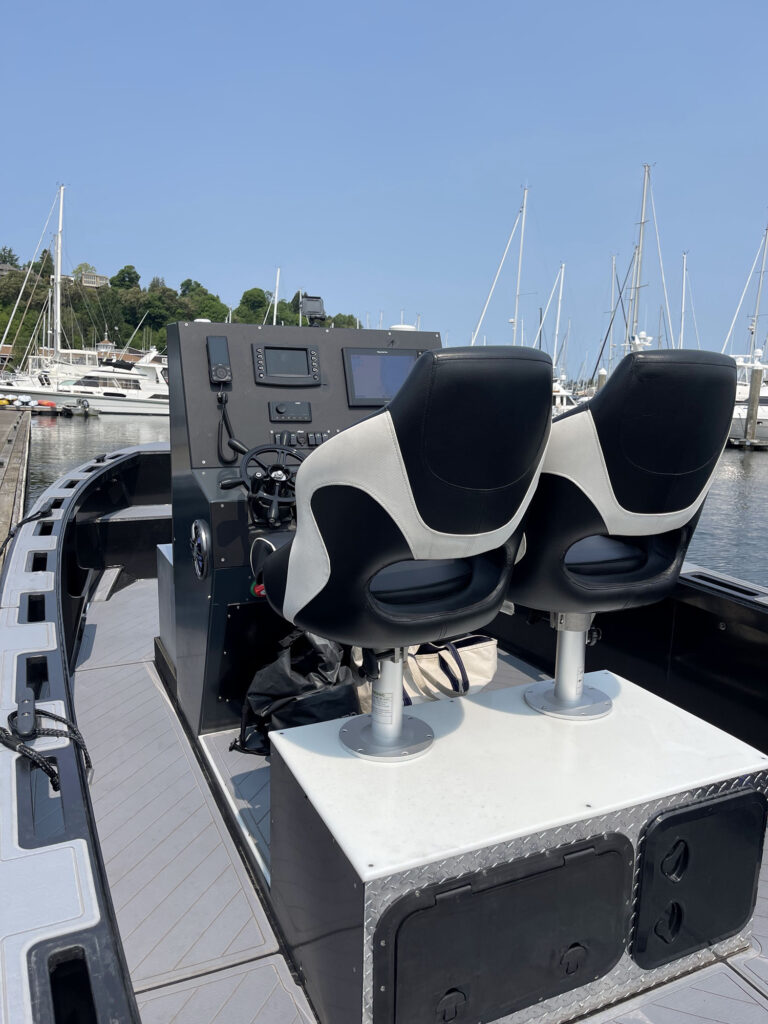
Maverick; renegade; rebel. Any of these adjectives could be used to describe the non-conformist attitude of LMM Boats, a new Seattle company challenging industry conventions with their new line of workboats made with HDPE plastic hulls. But, lofty as their ambitions might be, the origin story for this local boat builder is as real, raw, and relatable as can be.
The LMM stands for Legacy Master Marine, which might ring bells among boaters as the name of a south Seattle service and repair shop located on the Duwamish River, and yes, it’s one and the same. LMM Boats is the newest brainchild of Eric Hendrickson, the affable owner of Legacy Master Marine, who has enjoyed a long career in the maritime industry with stints as a licensed USCG Unlimited Chief Engineer, a traveling consultant for the drilling industry, and a shipyard supervisor in the building and outfitting of offshore supply boats. This was all on his native East Coast, before a job opportunity brought him out to Seattle in 2019. Here, he dabbled in more government work and contracts under his own company, EDC Engineering; gaining experience in fabrication, mechanics, and welding before purchasing the LMM boatshop from its original owners in 2021.
And here’s where the plot picks up: As Hendrickson was getting his feet wet as a boatshop owner, he simultaneously was looking to purchase a boat of his own, something tough and dependable, yet still speedy and fun. Given his background, he started looking for an aluminum workboat hull, but an internet bunny trail led him to a family-run company named Tideman Boats, out of Amsterdam, Holland, that was making hulls not out of fiberglass or metal, but plastic.
Intrigued, he reached out to them to ask questions about the fabrication and the answers were riveting: Tideman’s hulls were crafted out of a 100% high density polyethylene plastic that was fully recyclable, but also incredibly durable in the conditions of the sea. Not only that, because plastic is marine growth-resistant, they didn’t require the maintenance usually associated with vessels kept in saltwater—no need for bottom paint, no scraping, fewer haulouts.
“It was a bit of a light bulb moment for me,” Hendrickson says. “The fact that these hulls were super strong, yet environmentally friendly, and required almost no maintenance? It sounded like an unbeatable trifecta.”
As the two entities continued to chat, Tideman soon began making queries of their own as they learned about Hendrickson’s vast experience in the workboat industry and as a longtime diesel mechanic. As HDPE models didn’t have much of a presence stateside, Tideman proposed that together they bring something new to the U.S. market: A line of workboats fabricated by LMM in Seattle utilizing Oxe diesel motors and Tideman HDPE hull materials.
“As aluminum has really been ingrained as the industry standard here in the U.S., from government to commercial, I knew introducing HDPE as a viable alternative would be a challenge, but one I was totally up for,” Hendrickson says.
It was an enthusiastic “yes” from Hendrickson, and no holds barred from there.
The first challenge is consumer awareness, or perhaps lack thereof. “When you first say ‘plastic,’ most people think it’s a mold, and thus pretty rigid, design wise,” he says. “But it’s not, the material actually comes in big sheets that we then fabricate, so we can actually be pretty flexible. If someone wants the vessel to be a little bit wider, or asks for a specific feature, it can be done. It’s a great base platform to work with.”
After spending about a year learning the ins and outs of the fabrication—Hendrickson describes the plastic as extremely fun to work with, more pliable and forgiving than aluminum, and thus easier to create an essentially seamless weld—LMM debuted its prototype model in February 2023 at the Vancouver Boat Show, following that appearance with one at the Anacortes Boat Show in May, and another showing at a multi-agency craft conference in June in Virginia.
There, he performed a demo that speaks to the craft’s durability, running the LMM prototype aground on a rocky beach with several government officials onboard. “We just hit the throttle and went for it, right up on the rocks near Norfolk Naval Hospital with them aboard. There wasn’t a scratch on it. They were totally shocked.”
Demo rides like this have proved to be instrumental in helping Hendrickson to evangelize the benefits of the HDPE, as many riders also comment on the swift and stealthy ride as the boat moves through water. “It’s definitely a different feel than aluminum, there’s none of that metal twang and bang, it’s a much quieter ride,” he states.
A contribution to that smoothness, as well as to the stability, is that the hull is filled with polyethylene balls, instead of foam, to help the overall buoyancy. The HDPE material itself is durable, fabricated in a thicker construction than standard 1/4-inch aluminum, that is still comparatively lightweight. Hendrickson himself owns a 24-footer with a HDPE hull outfitted with a center console and an OXE 200HP diesel outboard engine that weighs in at 6,400 pounds.
While the primary target audience is more commercial—in addition to patrol and survey work, Hendrickson points towards fuel spill response where the hull would excel since it doesn’t absorb chemicals or moisture—he also firmly believes there is potential within the recreational sector, especially here in the Northwest. “People here love to run up to the islands and explore, and you can beach this boat pretty much anywhere you want, and you are good to go.”
As of press time, LMM Boats is accepting orders for vessels in three hull sizes, with a choice for either a center console or cabin option, that Hendrickson and his team can currently deliver in an 8-to-10-week time frame (for a center console boat). The customer is brought in early in the process to ensure that each hull is fit for its intended purpose, with the option to customize the layout, fuel capacity, electronics and lighting, and engine options and packages.
For now, the robust, modular vessels all arrive in a striking UV-resistant black hull, which happens to be the easiest, most efficient hue to produce the HDPE, but it sure seems like a fitting coincidence that black is the chosen color of rebels everywhere.
>> For more information on LMM Boats, go to: lmmseattle.com/lmm-boats.
